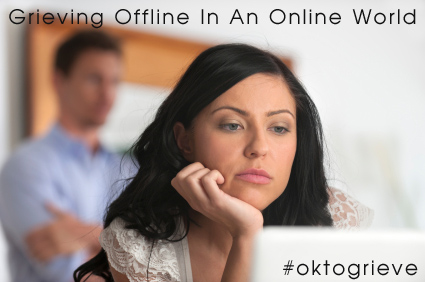 We recently had a death in the family.
We recently had a death in the family.
My husband and I have talked about ‘Grieving Offline In An Online World’ in great detail for weeks now and we both agreed that writing about this may help those in our situation.
Dealing with death and trying to gingerly explain to our clients and friends, without getting into too much detail, as to why we needed time to grieve privately brought it to our attention that we had one more issue to deal with. . . the online world.
Think for a moment of how you yourself have dealt with a family member’s death. There are so many things to do, emotions to deal with and arrangements to make. Death is never easy to deal with, but I personally feel that it has gotten a little more difficult due in large part to how connected we all are online.
Our natural need to share condolences once we hear the news of loss often gets a little awkward when done on Facebook or Twitter. Dealing with grief, for some, may mean they take a break from social media – choosing to grieve privately. . . but that too can draw concerned attention from fans or followers.
The question remains; How do we deal with death offline in an online world?
With social media there is a connectedness we have to each other that, at times, brings with it a sense of entitlement. Our friends, family and clients all share in our daily lives and it is natural that they would want to comfort us as we grieve. Though we may welcome a hug, a phone call or handwritten note . . . we may not be ready to share our pain in 140 characters or less.
My feelings vacillate on this subject, as I have been moved to tears sharing in my grief and the outpouring of love and admiration online for friends who have passed. The grieving process never truly ends . . . it simply transforms you. But is it appropriate to “like” and “share” a post heralding the death of a friend or loved one? Where does our online world respectfully intersect with our private grief?
These questions brought from memory a handful of online experiences that I have witnessed over the years.
A parent, who had recently lost a child, had to ask a Facebook friend to please not publicly post about the loss to her profile. It was already too much to deal with personally – but having to deal with it publicly on Facebook was more than the mother could bear.
I’ve also seen a grief stricken and social media novice mother take to her son’s twitter account to update friends and followers of her son’s death. . . finding comfort in the kind words of those who admired and cared for her son. She and the community that loved her son grieved together.
But where there is comfort there can also be pain. I recall one mother who was tormented by insensitive trolls that blamed her tweeting for the death of her child. It was unbearable to see such a vile side of strangers who barely knew this young mother but took such great pleasure in their cruelty and reveled in her anguish. It was a harsh wake up for me to have witnessed this in a global online community I naively believed was full of ‘good to the core’ users. Though I believe there are a tremendous amount of people who are positive and share in community building – I also know there are those who do not.
For some, the out pouring of online condolences or well wishes to family members, who are gravely ill, may be the life line they need and to others such an act would only compound the pain.
My husband, Brandon Pierce, said recently over coffee “When telling people of my loss, I now have to add the caveat ‘please don’t share this publicly’. 10 years ago I would have never had to do that.”
He brought about a valid point. When sharing news of a loss, whether we like it or not, it is up to us to let the people we share it with know whether or not we want to discuss the death in such a public way.
We can no longer take it for granted that such an intimate and heartbreaking event, such as death, is private.
Join in the discussion on Twitter by using the hashtag #oktogrieve and if you prefer Facebook there is a discussion here to share your thoughts on how social media has changed how we communicate about death and how we each move through our own grieving process.
As always I appreciate your comments here as well.
—
How have you dealt with death online and off?
Do you feel there is an unspoken rule of respect when it comes to dealing with death on social sites?

